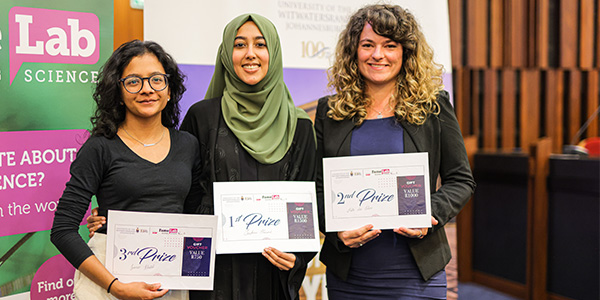Chemistry student wins Wits leg of the Famelab
- Wits University
Taskeen Hasrod wins over the audience in explaining how to use AI in water research

Three outstanding Witsies win at the Wits’ leg of FameLab, an international science communication competition that seeks to inspire young scientists to share their research. The FameLab competition takes place annually on campus.
Taskeen Hasrod, a Masters student in Chemistry walked away with the honours in this years’ FameLab international science communication competition.
Hasrod beat runners-up, PhD student Kate Da Silva and Sameera Khatib to the post, as she captivated the judges with her passion, charisma and confidence when explaining her research focused on the applications of Artificial Intelligence (AI) in Environmental Analytical Chemistry with a focus on water research.
“I really enjoyed the experience and especially enjoyed learning how to present my research in an exciting, engaging and understandable manner to a non-scientific audience in a short period of time,” said Taskeen Hasrod, Master of Science in Chemistry student. “The interactive workshops were incredibly useful, and I am very thankful for the feedback we received. FameLab is a great platform to showcase one’s research to the public,” she added.
As first place winner Hasrod will represent Wits University at the national FameLab competition later this year battling other University hopefuls for a chance to be crowned the South African winner and to represent the country at the International FameLab 2023 competition.
Da Sliva, who shared her impactful research that seeks to study molecules released from a healthy liver to develop a product that can assist liver repair as a therapeutic outcome said she was thrilled about the workshop. “I thoroughly enjoyed learning to communicate with a new audience and how crucial word choice and storytelling become when the general population is considered. The structure of the workshop allows for learning a lot of necessary content in a fun and understandable manner.”
The competition is split into two legs. In the first leg, students attend a science communication training workshop, where they learn how to communicate their science to a public audience without the use of jargon and how to easily explain concepts and phases without losing the integrity of their work. In the second leg, students participate in a heat session where they present their science in under three minutes to judges and the audience.
Outside of the technical skills acquired throughout the workshop, students are encouraged to engage with researchers outside of their field of study and area of expertise. “I learnt a great deal about research communication, and collaborating with researchers outside of my field whom I otherwise would have never met,” proclaimed first runner up Sameera Khatib, a Master of Pharmacy student.
Cross-disciplinary collaboration is an important pillar of Wits’ 2033 strategic plan, said Shirona Patel, head of communications at Wits.
“Wits seeks to encourage cross-disciplinary and transdisciplinary work to foster innovation from the global south,” said Patel.
Witsies between the ages of 21 and 35 are encouraged to participate in the competition. The focus of the competition is on the communication of Science, Technology, Engineering and Mathematics (STEM). However, students in fields outside the STEM family are also welcome to enter.

